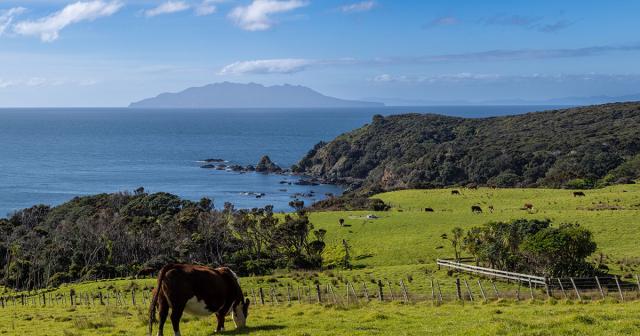Beef + Lamb New Zealand (B+LNZ) has led the development of an unprecedented joint statement by global agricultural organisations calling for countries to follow best scientific practice and take a split-gas approach when reporting greenhouse gas emissions.

Over 30 organisations across 14 countries, as well as several multi-national organisations, have joined the call with a clear message to their governments and the UN Framework Convention on Climate Change (UNFCCC) that methane is different to long lived gases and reporting metrics must recognise that.
B+LNZ Chair Kate Acland says the joint call builds on growing international momentum for more accurate and fair climate reporting.
“B+LNZ has taken the lead to build the international consensus on the need to follow a split-gas approach when reporting greenhouse gases from agriculture. This is the culmination of more than four years of effort in building these global conversations, so we’re delighted to achieve this level of support for the joint statement.”
“The importance of a united position from agricultural producing nations on climate change metrics and emissions targets was a major subject of conversation during my visit to Ireland, the UK and the US in May. Since then, B+LNZ has been working hard behind the scenes to get this across the line.
“New Zealand already has split-gas domestic targets, and B+LNZ has long advocated for this science-based approach to be replicated internationally. This would make it clear where emission reductions are expected, and in the case of methane, in what sector.
“It’s vital we use a split-gas approach. Bundling all emissions into a single GWP100 metric hides the real story. It ignores the different warming effects of short- and long-lived gases and makes it impossible to see what countries are actually planning to emit or reduce.
“The use of GWP100 is particularly concerning in the New Zealand setting where methane emissions are already reducing.
“GWP100, which works well for long-lived gases like carbon dioxide, is inaccurate when measuring the warming impact of short-lived gases such as methane, especially when those emissions are trending down.”
The global alignment of industry groups and other countries gives the call more weight, she says.
“Amplifying this message alongside our international counterparts is more likely to get cut-through with policymakers and UNFCCC.”
The international joint statement – signed by agricultural organisations from Argentina, Australia, Cambodia, Canada, Colombia, Georgia, India, Ireland, Kenya, New Zealand, South Africa, the
United Kingdom, the United States, and Uruguay – calls on parties to the UNFCCC to use a split-gas approach in their Nationally Determined Contributions (NDCs) under the Paris Agreement.
It says:
“The current practice of using GWP100 to report NDCs creates ambiguity by obscuring the warming impacts of the different gases. Although GWP100 works well when summing or comparing the warming impact of various long-lived GHGs (such as carbon dioxide and nitrous oxide), it does not accurately represent the warming impact of short-lived GHGs (such as biogenic methane).
“The science is clear: emissions of long-lived gases must reach net zero to prevent further warming. In contrast, emissions of short-lived gases like biogenic methane only need to decline gradually to have the same effect. This fundamental difference needs to be recognised in climate policy, and adopting a split-gas approach is the most effective way to do so.”
The statement also notes that a split-gas approach does not restrict ambition:
“Ambitious mitigation approaches for both long-lived and short-lived GHGs are possible with a split-gas approach. Instead, it focuses policy on the warming impact of the gases and therefore on the warming impact between sectors.”
The approach aligns with the intent of the Paris Agreement, which highlights the importance of maintaining food production and safeguarding food security, says Acland.
“Many countries recognise the importance of food production and want to use technology and improved farming practices to achieve emissions reduction goals, rather than cutting production or animal numbers.
“We, alongside these other organisations, will continue to advocate for split-gas reporting with their governments.”
The international statement can be accessed here: Beef + Lamb New Zealand leads global agricultural organisations in united call for split-gas GHG emissions reporting (PDF, 700KB)
ENDS
For more information, please contact [email protected] or call 027 359 806
Notes to editors
The joint statement represents: Argentina – Mesa Argentina de Carne Sustenable; Australia – Australian Wool Innovation Ltd, Cattle Australia, Sheep Producers Australia; National Farmers Federation; Cambodia – Cambodian Farmer Federation; Canada – Canadian Cattle Association, Canadian Federation of Agriculture, Canadian Sheep Federation; Colombia – Federacion Colombiana de Ganaderos; Georgia – Georgian Farmers Association; India – United Farmers Front; Ireland – Irish Farmers Association, Meat Industry Ireland; Kenya – Kenya National Farmers Federation; New Zealand – Beef + Lamb New Zealand, DairyNZ, Federated Farmers of New Zealand; South Africa – Red Meat Industry Services, Southern African Agri Initiative, TLU SA; United Kingdom – British Meat Processors Association, National Farmers Union, National Sheep Association, Quality Meat Scotland; United States – Meat Institute, National Cattlemen’s Beef Association, US Roundtable for Sustainable Beef; Uruguay – Asociacion Rural, Cooperativas Agrarias Federadas, Federación Rural; and Global/International – Global Roundtable for Sustainable Beef, International Wool Textile Organisation.
The earlier scientific call for separate reporting of long- and short-lived GHGs can be found here.